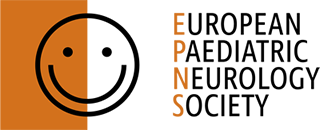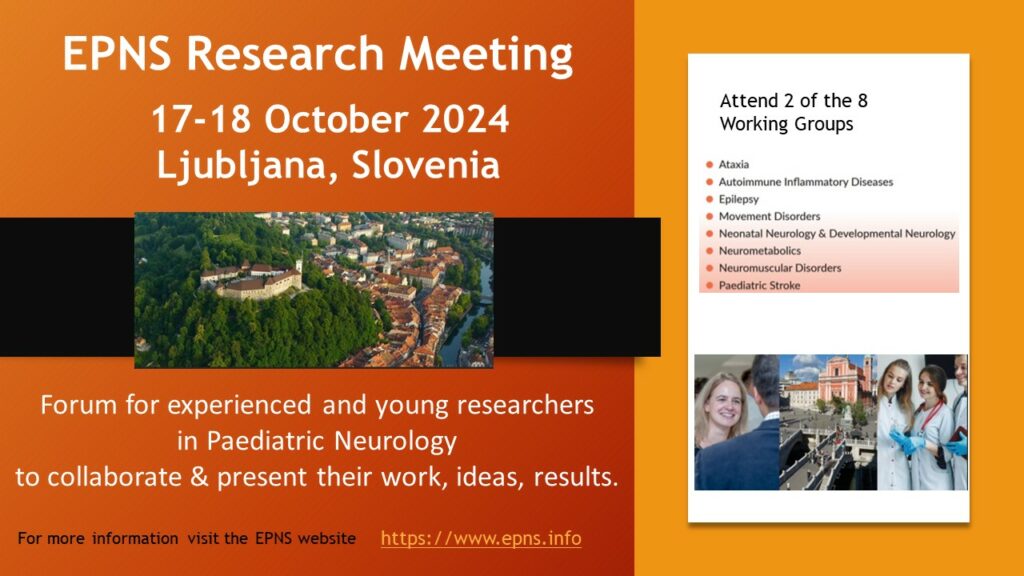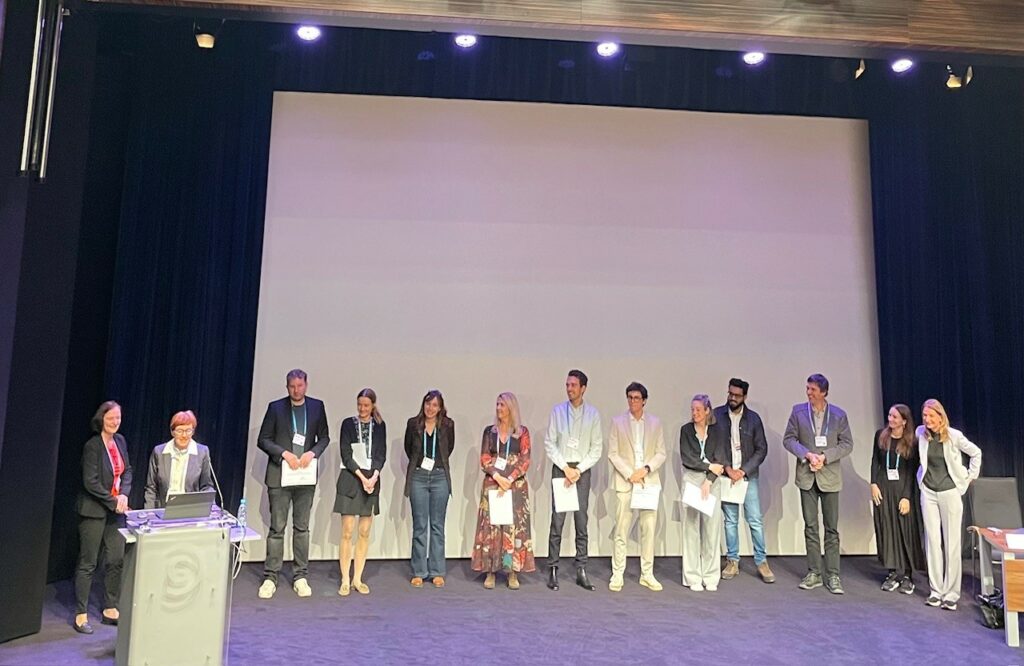The 8th EPNS Research Meeting took place in Ljubljana 17-18 October 2024 at the Cankarjev dom centre with an environment that stimulated international collaborations and research in Paediatric Neurology.
Organising Committee:
- Professor Barbara Plecko, Chair EPNS Scientific and Research Committee, Universitätsklinik für Kinder-und Jugendheilkunde, Graz, Austria
- Professor Zvonka Rener Primec, University Children’s Hospital Ljubljana, Slovenia
- Dr Jasna Oražem Mrak, University Children’s Hospital Ljubljana, Slovenia
There were prestigious invited speakers and 8 different working groups, with the Epilepsy working groups being allocated 2 slots.
Participants were given the opportunity to attend 2 different working groups.
We were thrilled to welcome child Neurologist researchers at all stages of their career: leaders/senior colleagues, junior scientists and PhD students.
EPNS RESEARCH PRIZE
Two EPNS Research Prizes (2500 Euros per person) were awarded for the presentation of outstanding, innovative ideas in research in Paediatric Neurology. A commission of the board members decided the prize recipients.
Sincere congratulations to our 2 EPNS Research Prize winners for 2024:
Marietta Papadoupolou, France: who is very happy and grateful for the EPNS Research Prize for the project “The ENGenE App: development and validation of an educational diagnostic algorithm on epilepsy nosology”. Marietta reported that this project is an ongoing collaborative work, supported by the ERN EpiCARE and the ILAE, aiming to create an intelligent tool for trainees and non-experts, which will enhance and stratify knowledge on epilepsy syndromic classification, with focus on genetic aetiologies. This Prize highlights the commitment of the scientific societies on supporting the use of technological advances to support training and education. Marietta intends to use the award for participation in scientific meetings in order to stay updated on the topic and support dissemination of the ENGenE App progress.
Sam Geuens, Belgium: is very honoured to be granted this award for his neuromuscular research lecture entitled ‘Development and pilot validation of the DuMAND Checklist to screen for Duchenne Muscular Dystrophy-Associated Neurobehavioral Difficulties (DuMAND)’. The funds will be used to invest in new equipment for the research group, so they can improve their functionality plus the remaining funds will be invested into additional training in research management.
6 delegates were also presented with certificates of achievement their excellent presentations
Day 1: Thursday 17 October 2024
11:00-11:30 Registration
11:30-12:00 Lunch
12:15-12:30 Welcome
12:30-13:00 Professor Dr. Jasna Križ, Canada: Deregulation of Immunity in the injured brain – novel regulatory mechanisms and targets for therapy
13:00-13:15 move to break-out rooms
13:15-16:00 Band 1 Working groups 4 in parallel rooms, there will be an Epilepsy session in both bands. Participants attend ONLY ONE of the following 4:
- Epilepsy 1
- Movement Disorders
- Neurometabolic
- Paediatric Stroke
16:00-16:30 Break
16:30-19:15 Band 2 Working groups 5 in parallel rooms, there will be an Epilepsy session in both bands. Participants attend ONLY ONE of the following 5:
- Epilepsy 2
- Ataxia
- Autoimmune & Infectious Diseases
- Neonatal Neurology & Developmental Neurology
- Neuromuscular
19:30 Get together and dinner in CD Club. Delegates will receive a complimentary glass of wine, and there will be an open bar to purchase additional drinks
Day 2: Friday 18 October 2024
09:00-09.30 Professor Eugenio Mercuri (virtual) and Dr Jos Hendriksen, Netherlands: the BIND project: brain related comorbidities in DMD
09.30-10:00 Professor Roman Jerala, Slovenia: Development of targeted therapies for rare genetic diseases in child neurology
10:00-10:30 Break
10:30-12:30 Awards with presentations: there will be one presentation from each Working Group:
- 2 EPNS Research Prize winners
- 6 Best Presentation winners
12:30-13:30 Farewell Lunch
SCROLL TO THE END OF THIS PAGE TO SEE FULL DETAILS ABOUT EACH OF THE 8 WORKING GROUPS PLUS CONTACT DETAILS FOR THE CHAIRS OF EACH GROUP.
EACCME® accreditation:
The EPNS Research Meeting 2024, Ljubljana, Slovenia 17/10/2024 – 18/10/2024, was been accredited by the European Accreditation Council for Continuing Medical Education (EACCME®) with 9.0 European CME credits (ECMEC®s). Each medical specialist should claim only those hours of credit that he/she actually spent in the educational activity.
Through an agreement between the Union Européenne des Médecins Spécialistes and the American Medical Association, physicians may convert EACCME® credits to an equivalent number of AMA PRA Category 1 Credits TM. Information on the process to convert EACCME® credit to AMA credit can be found at https://edhub.ama-assn.org/pages/applications .
Live educational activities, occurring outside of Canada, recognised by the UEMS-EACCME® for ECMEC®s are deemed to be Accredited Group Learning Activities (Section 1) as defined by the Maintenance of Certification Program of the Royal College of Physicians and Surgeons of Canada.
8 WORKING GROUP invitations in DETAIL:
| EPNS Working group and Description | Chairs |
| Autoimmune and Infectious Diseases Autoimmune and Infectious Diseases working group welcomes contributions addressing all aspects of inflammatory CNS diseases, including autoimmune disorders, infectious diseases and further inflammatory processes affecting the nervous system. Primary goal of the group is to present own research projects. This may include presentations on finished and on newly planned projects. Proposals with calls for collaboration are particularly encouraged. | Martin Häusler Germany) EMAIL
Sandra Bigi (Switzerland) EMAIL |
| Ataxia: Research in the field of the cerebellum and ataxia is growing fast over the last decade. The ataxia working group is an active group, focussing on international collaboration covering many multidisciplinary aspects of ataxia and the cerebellum. During this workshop opportunity in Lubljana in October 2024 we cordially invite you to present, participate and learn about upcoming and on-going projects. If you have a project to share or discuss, if you would like to participate in international projects, or if you are interested in the amazing cerebellum, please feel welcome to join! | Deborah Sival (Netherlands) EMAIL
Maja Steinlin (Switzerland) EMAIL |
| Epilepsy working group is a very active formation of epilepsy researchers throughout Europe, many working in accredited centres of the European Reference Network for Rare and Complex Epilepsies, ERN EpiCARE ( https://epi-care.eu) with collaborations overseas. We have collaborated in many successful projects and studies over time. During the EPNS research meeting 2024 we aim to discuss new research proposals, interesting recent and innovative studies and ongoing (multicentre) projects. We would particularly like to give the floor to young researchers in the field to present their research ideas or results during short presentations of 10-12 minutes as well as welcome calls for collaboration with other paediatric epilepsy centres. We are also very interested to discuss identified unmet needs in paediatric epilepsy research. We ask young researchers to submit their abstracts before the end of June 2024. Even if you do not plan to present your work, we would like to encourage you as much to attend our working group meeting and participate in lively brainstorming discussions. We look forward to receiving your contributions and to meeting you during the EPNS research meeting in Ljubljana, 2024. | Alexis Arzimanoglou EMAIL
Floor Jansen (Netherlands) EMAIL Lieven Lagae (Belgium) EMAIL |
| Movement Disorders Dr Jean-Pierre Lin and Prof. Michel Willemsen (Joint Chairs) for the EPNS Research Meeting in Ljubljana 18-19 October 2024, invite you to present your work on any aspect of movement disorders in children and young people. The purpose of the meeting is to allow clinical science researchers to discuss their work, which can span any aspect from the bench to the bedside, in an interactive, positive, and stimulating program and setting. We are particularly interested in clinicians, including allied health professionals, currently or recently involved in work leading to a doctoral thesis. Please contact both of us with a synopsis of your ideas and proposals for the meeting. | Jean-Pierre Lin (UK) EMAIL
Michel Willemsen (Netherlands) EMAIL
|
| Neonatal Neurology & Developmental Neurology: The scientific programme and discussion will cover newest research data on models of perinatal brain injury such as hypoxia and ischemia, and excitotoxic injury, as well as their effects and their contribution to clarify the pathophysiology of acquired neonatal brain injury. We will also include groups interested in brain development, including fetal neurologists and specialists of cortical malformations from basic scientist, neuro(foeto)pathologists, fetal radiologist to paediatric neurologist.
You are welcome to bring your own ideas, to inform about your own model, to get help in choosing an appropriate model for your own research questions. We would like to develop collaborative work within this group, from basic scientists to clinics. Information on neuroprotective strategies will be shared and possible joint research on fetal and perinatal brain injury will be discussed. We are looking forward to the presentation of your own ongoing research in this area. We will give you 10-15 min slots for presentation and discussion! Please submit your contribution with a title and a short summary on the topic. If you do not plan to present your work, we would like to encourage you to attend our working group to participate in lively discussions of ongoing projects |
Nadia Bahi-Buisson France) EMAIL
Regina Trollmann (Germany) EMAIL |
| Neurometabolics: The Neurometabolic Working Group is happy to accept research projects on diagnosis, pathomechanisms, care and treatment of paediatric neurometabolic disorders. The provided platform offers a great opportunity to establish and strengthen European research networks in the field of neurometabolic disorders in child neurology. We explicitly encourage young researchers to present projects at various stages of realisation – from application or recruitment to preliminary conclusions or final results. See you in our EPNS Research Meeting : ) | Barbara Plecko (Austria) EMAIL
Dimitrios Zafeiriou (Greece) EMAIL |
| Neuromuscular: The Neuromuscular Working Group aims to discuss the latest research developments relevant for the diagnosis, care and treatment of paediatric neuromuscular diseases. The discussion will focus on the application of new approaches for clinical trials, implementation of novel therapies, and the European reference network for neuromuscular diseases (EURO-NMD). Further, new developments and pitfalls in genetic diagnosis, impact of standards of Care, and transition to adulthood care will be discussed. The working group session also will offer an opportunity for scientists and clinicians to present and discuss own research ideas and results.” | Guenther Bernert (Austria) EMAIL
Thomas Sejersen (Sweden) EMAIL |
| Paediatric Stroke: We are happy to invite you to the meeting of the Paediatric Stroke Working Group in Ljubljana, 17-18 October 2024. After a keynote lecture, we will be happy to learn more about your research projects in childhood neurovascular disorders (planned or already ongoing) and to discuss possibilities for a collaborative network. Ideas for research networks sometimes appear from unsolved cases – so please bring any interesting cases and/or diagnostic/management questions to our next meeting! We are really looking forward to seeing you there! | Lucia Gerstl (Germany) EMAIL
Finbar O´Callaghan (UK) EMAIL |


